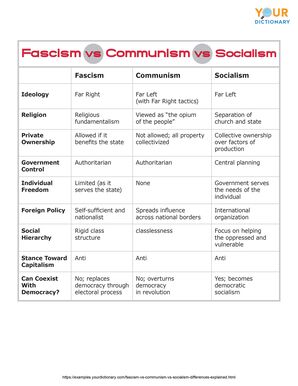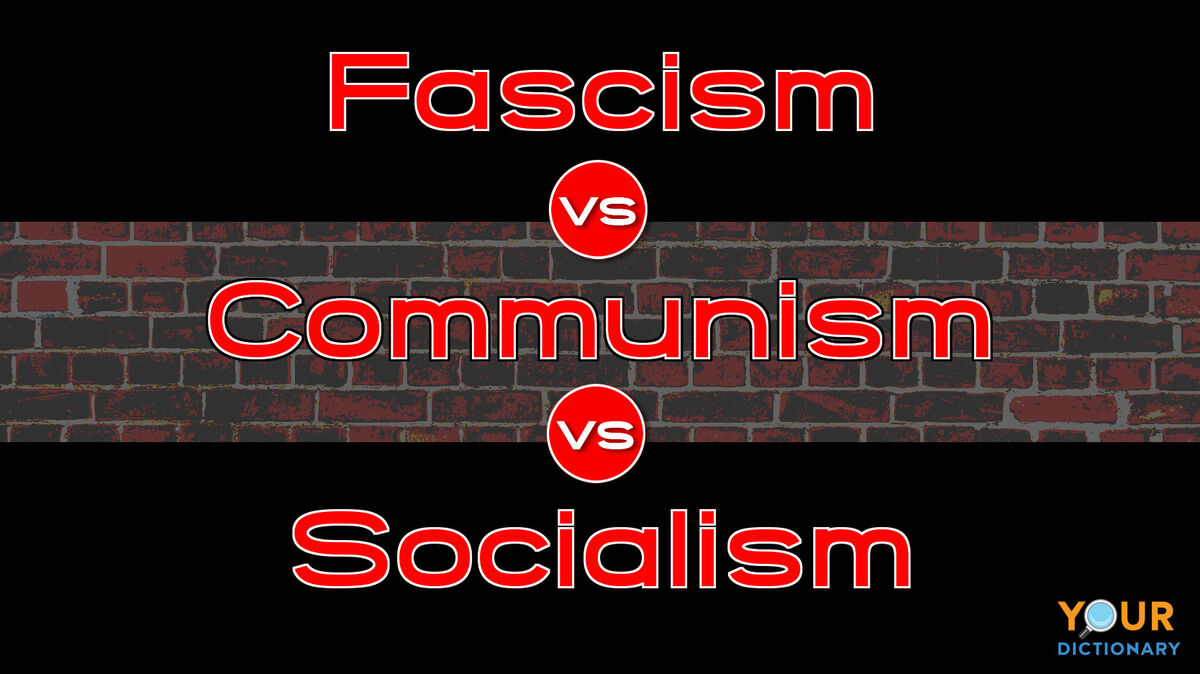

You may have heard the terms fascism, communism and socialism when describing an overcontrolling government. They are different from a democratic government and a capitalist economy, but they are also different from each other. Keep reading to learn the differences between fascism vs. communism, fascism vs. socialism and communism vs. socialism.
What Is Fascism?
Fascism is a government system led by one person, a dictator, who has complete power over the country. It's also known as a totalitarian government. Citizens of fascist countries must surrender their individual liberties and pledge extreme allegiance to their leader.
Origins of Fascism
Benito Mussolini created the one-party fascist state in post-World War I Italy. His concept of fascismo is based on the Latin word fasces ("bundle of sticks") which was favored in ancient Rome as a symbol of strength, as a bundle of sticks is much harder to break than a single stick. The rise of Mussolini's National Fascist Party is just the first of many historical examples of fascism.
Principles of Fascism
When you call someone a fascist, you're commenting on their oppressive nature. But there's a lot more to the differences between fascism vs. communism or fascism vs. socialism. The principles of fascism include:
- Anti-Neutralism - Fascists do not believe in seeing "both sides" or staying neutral; you're either with them or against them.
- Anti-Union - Labor unions are illegal in fascist nations, and are replaced by government-controlled labor organizations.
- Autarky (economic self-sufficiency) - Fascist countries reject both economic socialism and the free market of capitalism and prefer to be completely self-sufficient without relying on other nations.
- Economic Regulation - The government controls economic activity. It allows private profit — as long as that profit benefits the state.
- Far-Right Ideology - Fascism falls on the far right side of the political spectrum, favoring racial purity, religious fundamentalism and limited personal freedom.
- Nationalism - Citizens must put the country before their own interests, and the nation puts its own needs before all other nations.
- Social Hierarchy - Those in a fascist nation don't believe in equality. They believe that class conflict is important to maintaining order in the nation.
- Strength - Fascist governments are militaristic, and they use violence and brutality to demonstrate their strength on the world stage.
- Victimhood - The country sees itself as a victim of other nations' cruelty. It believes that it can do whatever is necessary to right the wrongs done by other nations.
What Is Communism?
Unlike fascism, a communist government focuses on equal treatment and opportunities for all citizens. It opposes capitalism, which encourages private profit and the empowerment of the individual. The philosophy of communism includes spreading its influence across country borders.
Origins of Communism
The word communism comes from the Latin communis, which means "common" or "universal." The concept of an egalitarian society without classes or economic privilege has roots in ancient Greece, the European Renaissance and the Age of Enlightenment. However, it was Karl Marx and Friedrich Engels who defined modern communism in their 1848 pamphlet The Communist Manifesto. In one of the most famous examples of communism, Vladimir Lenin's Bolshevik party took control of Russia in the 1917 Bolshevik Revolution.
Principles of Communism
The most basic tenet of communism indicates that workers who are responsible for producing wealth should have a share of that wealth. But there are more important principles in a communist government, including:
- Anti-Capitalism - In communist governments and economies, there is no free market or private profit. Communists reject what they perceive as selfishness and greed in capitalism.
- Anti-Religion - Marx regarded organized religion as "the opium of the people" because it prompts workers to accept capitalist oppression as part of their god's plan.
- Authoritarianism - The first phase of a communist state is the revolution, followed by a period of authoritarian control (phase 2) before surrendering control to the people (phase 3). However, no modern communist state has been able to move from phase 2 into phase 3, as leaders have held on to their control.
- Classlessness - Communists believe in a society that doesn't have social or economic class divisions (such as bourgeoisie vs. proletariat). The state is run by members of the working class in the interest of the working class.
- Collectivism - Communist countries demand that all property is turned over to the state to be shared with all citizens.
- Government Control - Communists believe that the government must intervene heavily in citizens' lives to keep them from achieving more than others. This includes control over education, employment and even marriage and family.
- Far-Left Ideology, Far-Right Tactics - The concepts of social equality and sharing resources are a fundamental part of far-left ideology. However, the modern implementation of communism, including authoritarianism and limiting individual freedom, are closer to the right side of the political spectrum.
- International Influence - Communism is meant to be spread across the globe, not controlled within a country's borders.
- Revolution - In order to achieve a communist utopia, the communist party must revolt against the ruling class — violently, if necessary. While some communists believe in reforming an existing government, most think that the entire structure must be overthrown and started again.
What Is Socialism?
Many people believe that socialism and communism are basically the same thing. While communism is a form of socialism, the two government systems are quite different in practice. Socialism can co-exist with capitalism, unlike communism, and does in most modern democracies (known as democratic socialism).
Origins of Socialism
The term socialism comes from the Latin sociare and the French social, meaning "to share." It arose during the Age of Enlightenment as a reaction to Adam Smith's theory of capitalism. The movement gained popularity with Marx's work in sociology and economics, and there are several examples of socialism found in 19th, 20th, and 21st-century politics.
Principles of Socialism
The clearest way to see the differences between communism and socialism are in their philosophies. Some of the main principles of socialism include:
- Central Planning - Purely socialist governments intervene in economic activity, rather than trust the "invisible hand" of the free market. This includes government-owned companies and price regulation by bureaucrats.
- Collective Ownership - Also known as "social" or "common" ownership, this principle contends that the factors of production (labor, goods, natural resources) should be owned by all members of a society.
- Cooperation over Competition - Socialists reject the competitive nature of capitalism. They embrace egalitarianism as the ideal way to ensure social stability.
- Distribution of Wealth - Socialist societies have high tax rates that are redistributed into government programs and infrastructure. It relates to Marx's quote: "From each according to ability, to each according to need."
- Equality of Opportunity - Socialism embraces the concept of social equality and fairness. It works to eliminate social and economic barriers based on prejudice or lack of access.
- Far-Left Ideology - Socialism can be as far left on the political spectrum as fascism is far right. Advocates of socialism often believe in the elimination of private property, a strongly regulated economy and well-funded government programs.
- Protecting the Oppressed - The principle of protecting those oppressed by other is seen as a responsibility of government. Examples of government programs aimed to help underserved members of society include universal healthcare and welfare programs.
- Separation of Church and State - Socialists support religious freedom but do not believe in a relationship between the state and any religion in particular.
- Workers' Rights - Like communists, socialists support workers' rights. But instead of a workers' revolution, socialists advocate for labor unions and workplace regulations.

The Influence of Different Government Types
The difference between fascism vs. communism and fascism vs. socialism have come to define 20th and 21st century politics. But fascism, communism and socialism are only three types of government in the world. To contrast these types of government, learn more about how limited government functions, as well as its key principles and global examples. You might also want to understand some related terms like historic vs. historical.